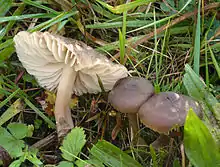Neohygrocybe nitrata
Neohygrocybe nitrata is a species of agaric (gilled mushroom) in the family Hygrophoraceae. It has been given the recommended English name of nitrous waxcap, based on its smell.[2] The species has a European distribution, occurring mainly in agriculturally unimproved grassland. Threats to its habitat have resulted in the species being assessed as globally "vulnerable" on the IUCN Red List of Threatened Species.[1]
| Nitrous waxcap | |
|---|---|
 | |
| Neohygrocybe nitrata, Czech Republic | |
| Scientific classification | |
| Domain: | Eukaryota |
| Kingdom: | Fungi |
| Division: | Basidiomycota |
| Class: | Agaricomycetes |
| Order: | Agaricales |
| Family: | Hygrophoraceae |
| Genus: | Neohygrocybe |
| Species: | N. nitrata |
| Binomial name | |
| Neohygrocybe nitrata (Pers.) Kovalenko(1989) | |
| Synonyms | |
Taxonomy
The species was first described in 1801 by mycologist Christiaan Hendrik Persoon as Agaricus nitratus. Czech mycologist Josef Herink transferred it to the genus Neohygrocybe in 1958, but this combination was not validly published. It was later validly combined by Alexander Kovalenko in 1989.
Recent molecular research, based on cladistic analysis of DNA sequences, has confirmed that Neohygrocybe nitrata is a distinct species but does not belong in Hygrocybe sensu stricto.[3][4]
Description
Basidiocarps are agaricoid, up to 60 mm (5 in) tall, the cap convex to flat, up to 70 mm (3 in) across. The cap surface is smooth, dry, sometimes breaking up into scales when old, grey-brown. The lamellae (gills) are waxy, pale grey to buff with whiter margins. The stipe (stem) is smooth, pale grey to buff, lacking a ring. The spore print is white, the spores (under a microscope) smooth, inamyloid, ellipsoid, measuring about 8 to 9 by 4.5 to 5.5 μm. Basidiocarps have a distinctly nitrous smell.[5]
Similar species
Neohygrocybe pseudoingrata, recently described from the Czech Republic and Slovakia, has a similar nitrous smell, but basidiocarps are typically larger and paler with white stipes.[4] The more widespread European Neohygrocybe ingrata has a context that stains reddish.[5][4]
Distribution and habitat
The Nitrous Waxcap is widespread but generally rare throughout Europe.[1] Like other waxcaps, it occurs in old, agriculturally unimproved, short-sward grassland (pastures and lawns).
Recent research suggests waxcaps are neither mycorrhizal nor saprotrophic but may be associated with mosses.[6]
Conservation
Neohygrocybe nitrata is typical of waxcap grasslands, a declining habitat due to changing agricultural practices. As a result, the species is of global conservation concern and is listed as "vulnerable" on the IUCN Red List of Threatened Species.[1] Neohygrocybe nitrata also appears on the official or provisional national red lists of threatened fungi in several European countries, including Croatia,[7] Czech Republic,[7] Denmark,[8] Germany,[9] and Norway.[7]
References
- Jordal, J. "Neohygrocybe nitrata. The IUCN Red List of Threatened Species". Retrieved 2022-05-02.
- Holden L. (July 2014). "English names for fungi 2014". British Mycological Society. Retrieved 2016-02-06.
- Lodge DJ; et al. (2014). "Molecular phylogeny, morphology, pigment chemistry and ecology in Hygrophoraceae (Agaricales)" (PDF). Fungal Diversity. 64 (1): 1–99. doi:10.1007/s13225-013-0259-0. S2CID 220615978.

- Fuljer F, Zajac M, Boertmann D, Szabóová D, Kautmanová I (2022). "Neohygrocybe pseudoingrata, a new grassland species from Slovakia and the Czech Republic". Fungal Systematics and Evolution. 9: 11–17. doi:10.3114/fuse.2022.09.02.
- Boertmann D. (2010). The genus Hygrocybe (2nd ed.). Copenhagen: Danish Mycological Society. p. 200. ISBN 978-87-983581-7-6.
- Seitzman BH, Ouimette A, Mixon RL, Hobbie EA, Hibbett DS (2011). "Conservation of biotrophy in Hygrophoraceae inferred from combined stable isotope and phylogenetic analyses". Mycologia. 103 (2): 280–290. doi:10.3852/10-195. PMID 21139028. S2CID 318326.
- "National red Lists". Retrieved 2022-05-02.
- "Den danske rødliste: Neohygrocybe nitrata". Retrieved 2022-05-02.
- "Red List: Neohygrocybe nitrata". Rote Liste Zentrum. Retrieved 2022-05-02.
